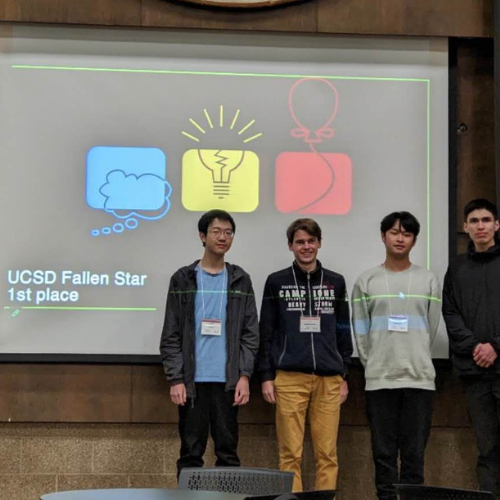
By Kimberley Clementi
A team of UC San Diego computer science and math students ranked first place in the Southern California Regional round of the International Collegiate Programming Contest (ICPC), the world’s largest and most prestigious programming competition. The team outperformed peers from UC Los Angeles, CalTech and the University of Southern California to clinch the coveted top spot.
UC San Diego’s Fallen Star team – students Thomas Li, Stanisław Strzelecki, and Shang Zhou – will represent the university at the ICPC North American Championship, scheduled for May in Orlando, Florida. The winners there will have the opportunity to compete in the ICPC World Finals.
During an ICPC competition, teams of three students are given a set of 10 to 13 algorithmic programming problems. They are allotted five hours and one computer to solve as many problems as they can in the shortest amount of time.
In this year’s regionals, held at Riverside City College, UC San Diego was represented by five teams. The Fallen Star teammates correctly completed eight out of ten problems – six of them on their first try, giving them a faster finish and, ultimately, the edge over their closest competitor. The remaining UC San Diego teams all placed in the top half out of 59 teams, finishing at 15 and 16 (with six correct problems) and 20 and 21 (with five correct problems).
“It was a really impressive performance, especially given that many of them are first-year undergraduate students,” said Jingbo Shang, a professor in the Department of Computer Science and Engineering and the Halıcıoğlu Data Science Institute. “I congratulate all teams and hope the best for UCSD Fallen Star in their Orlando trip.”
Shang, whose research focuses on data mining and machine learning, joined the leadership of the campus Competitive Programming club in 2020. His co-coaches, PhD students Zihan Wang from computer science and Qihao Ye from the math department, help students with a variety of skill levels participate in practice sessions.
Students train together every week, allotting three to five hours to work through a sample problem set similar to what they might encounter in a competition. The club holds selection contests to help students form teams and determine which teams qualify to compete. The organization also strengthens skills for internship or job interviews, including how to perform under pressure.

